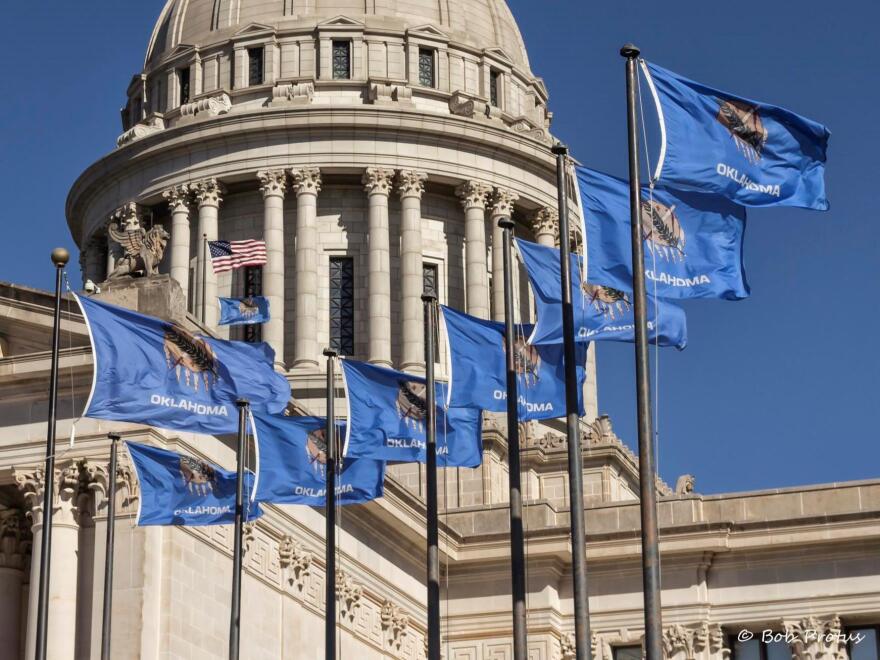With one special session underway and another one possible, the Oklahoma House and Senate reached agreement on a budget and adjourned sine die on Friday afternoon.
TRANSCRIPT
Capitol Insider sponsored by the Oklahoma State Medical Association, committed to connecting Oklahoma physicians with matters that are important to Oklahoma patients. More on the vision and mission of OSMA at okmed.org.
Dick Pryor: This is Capitol Insider - taking you inside politics, policy and government in Oklahoma. I'm Dick Pryor with Quorum Call publisher Shawn Ashley. The first session of the 59th Oklahoma Legislature is over. By law, the House and Senate must adjourn Sine Die by 5 p.m. on the final Friday in May. Shawn, it's a 16-week grind and it took all that time for legislators to negotiate, agree to, and pass the state budget. What are the highlights of the fiscal year 2024 budget?
Shawn Ashley: The budget totals $12.8 billion, a new state record. Eleven point-three billion of that is recurring spending - money that they should appropriate again next year and the year after that. And that's a new record, as well. While it includes record appropriations for the Department of Education, $3.9 billion, more than a $800 million increase, a lot of state agencies were held flat and saw no new funding. Now, the budget also includes some tax reductions, but not broad-based tax cuts like the individual income tax reduction or elimination of the sales tax on groceries that Governor Kevin Stitt had called for. Some of those reductions include the school choice tax credits, elimination of the marriage penalty, and elimination of the state's franchise tax.
Dick Pryor: So, what does Governor Stitt think about the budget lawmakers have sent to him?
Shawn Ashley: Well, he said Friday as lawmakers were still considering some of the bills, that he's going to look it over. He did express concern that lawmakers may have spent too much recurring revenue and may have dipped too deeply into the state's reserve funds for one-time expenditures. Stitt also said he is considering calling lawmakers back for another special session that would focus on reducing the individual income tax rate, something he has called for for several years now, but the legislature has yet to deliver, largely because of the Senate's concern on the long-term impact on state revenues.
Dick Pryor: Shawn, not only did the budget come together late, but overrides of gubernatorial vetoes happened late and fast.
Shawn Ashley: Yes, they did. Lawmakers overrode 13 of Stitt’s vetoes on Thursday, including several of the Senate bill vetoes he issued April 26th when he threatened to keep vetoing Senate bills until they came to an agreement on the school choice tax credit program, education funding, and a tax cut. The bills vetoed April 26th have become known around the Capitol as the “Tantrum 20,” and a couple of senators and at least one representative referred to Stitt’s tantrum that resulted in the vetoes. A number of other vetoes passed just one chamber, so those bills will not become law.
Dick Pryor: What vetoes did the House and Senate override?
Shawn Ashley: Among the 13 overridden Thursday were House Bill 2820, the Oklahoma Educational Television Authority Re-authorization. Senate Bill 429, the bill permitting students to wear tribal regalia at high school and college graduations. House Bill 2263, which reorganizes the membership of the Oklahoma Turnpike Authority, reducing the governor's number of appointees to two, and giving the House speaker and Senate president pro tem two appointments each. And Senate Bill 951, which increases the travel allowance for county commissioners and sheriffs. And then, of course, there were nine other overrides, as well.
Dick Pryor: With the regular session adjourning Sine Die, what are important dates ahead?
Shawn Ashley: Governor Stitt has until Thursday to sign or veto the budget bills passed in special session. He has until June 10th to act on the bills passed during the final five days of the regular session. And if lawmakers come back to override vetoes of any of the special session budget bills that is tentatively scheduled to take place on June 12th. But keep in mind, they would be dealing only with bills from the special session that the governor has vetoed. They would not be able to address any regular session vetoes that day. And if lawmakers don't reconvene the special session and adjourn it Sine Die before June 30th, it will adjourn Sine Die automatically on that day under the terms of a resolution adopted Friday.
Dick Pryor: It's been quite a ride this year. Thank you, Shawn.
Shawn Ashley: You're very welcome.
Dick Pryor: And that's Capitol Insider. For more information, go to quorumcall.online. You can find audio and transcripts at kgou.org and listen to Capitol Insider where you get your podcasts. Until next time, with Shawn Ashley, I'm Dick Pryor.
Announcer: Two men of color vanished after last being seen in the same deputy's patrol car. “I knew something was wrong. A mother knows. That's the strangest case and most unsettling case.” Listen to the Last Ride podcast, part of the NPR Network.





